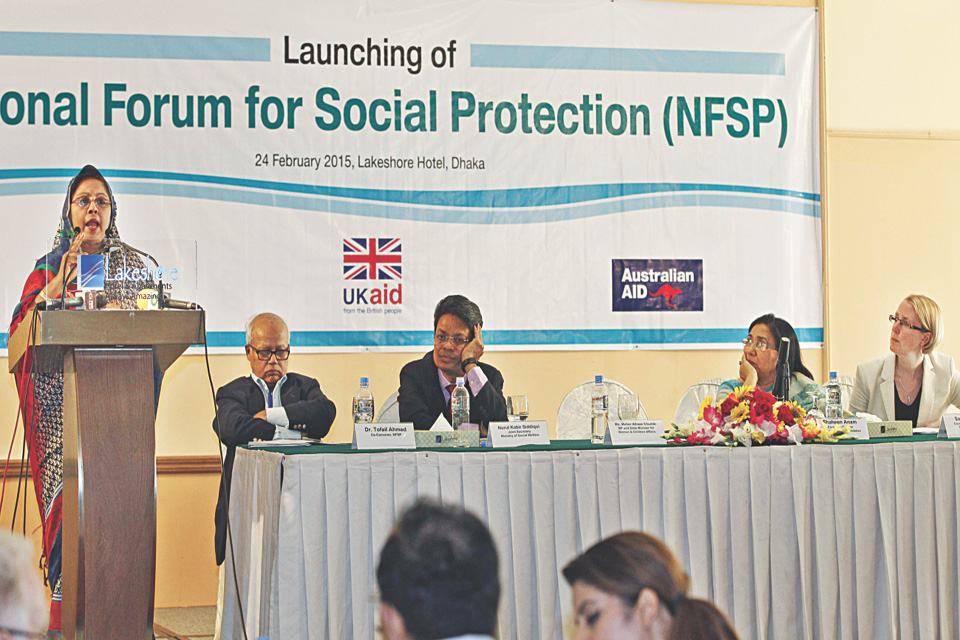Launch of National Forum for Social Protection
DFID Bangladesh Country Representative Sarah Cooke's speech at the launching event of National Forum for Social Protection in Dhaka.

Honourable Chief Guest,
Ms Meher Afroze Chumki, State Minster for Women and Children’s Affairs, Government of Bangladesh
Special Guests
Nasima Begum, Secretary, Ministry of Social Welfare Mohammad Abdul Wazed, Director General , Department of Disaster Management, Ministry of Disaster Management and Relief Distinguished participants, Ladies and Gentlemen, Good Morning,
It gives me great pleasure to be with you this morning. I’m particularly grateful that to those of you who have travelled from outside Dhaka to attend today. It’s good to have you here.
Thanks also to the team at the Manusher Jonno Foundation for organising this event today. I know that it takes a huge amount of work behind the scenes to make these events a success.
I would like to focus my remarks on 3 broad areas today:
- Why it is important to “leave no one behind” in the pursuit of growth and development
- The role of well targeted, well managed social protection to help “leave no one behind”; and
- The importance of the National Forum for Social Protection (NFSP) to ensure a voice for those whose voice is not always heard; and the important role that everyone here today can play to make that happen.
We all know that the best way for someone to lift themselves and their family out of poverty is by getting a job. That is why the UK Government is strongly focused on supporting the countries in which we work to put in place the right conditions for inclusive economic growth and job creation. That is, growth which benefits the poor and the marginalised.
But another important part of the effort “leave no one behind” is to ensure that social safety nets are available to help the poorest and most marginalised which mostly include women, elderly, people with disabilities and people from socially excluded groups like for example Dalits and those living in hard to reach areas like the chars.
Social Protection support comprise of direct transfer of resources to meet their needs, protect them from shocks and to help them invest in skills and capacity to better able to participate in economic activities.
The Government of Bangladesh invests heavily in social protection. The total amount spent on social protection in 2013, was equivalent to 2.2 percent of GDP – around 3 billion dollars spent through anywhere between 100-110 programmes. These include for example, allowance for old people and people with disabilities, food transfer to mitigate consequence of disasters like floods and stipends for children in primary and secondary education to retain them in schools. There are many more.
But, sadly, evidence indicates that a large proportion of poor and vulnerable households cannot access, and do not benefit from, these programmes. The allowances remain small relative to the needs of typical beneficiary representing anywhere between 15 to 40 percent of the poverty line.
Most importantly, though, 60% of the beneficiaries do not fulfil the targeting criteria. They can be termed as non-poor. That means although around 80 million people are reached through social protection programmes, majority are not entitled to receive them. Consequently, the impact on poverty reduction from these programmes is so much less than it could be. This has serious implications for women and girls as majority of the programmes are focussed in addressing their needs and vulnerabilities.
Through our Strengthening Government Social Protection Systems for the poor programme (SGSP), the UK Government, with our partners, is helping the Government of Bangladesh to make the social protection system better managed and better targeted.
This will mainly be done through building capacity Ministry of Finance and other ministries with major spend on Social Protection through research, diagnostics, training and most importantly creation of a Management Information System (MIS) to track expenditures and improved monitoring.
The National Forum for Social Protection is an important complement to that work – it will help ensure that the voices of those who should be benefiting from social protection are heard by decision makers.
Members of the Forum will gather beneficiary feedback on impact, outreach and effectiveness of different social transfers across Bangladesh and share these evidence at the national level for necessary policy changes. We believe demanding accountability and transparency is crucial to building accountable and transparent institutions. I believe people have right to be heard and they have a right to be listened to. Transparency is important not just for accountability and also to make sure that we get good development outcomes.
I am glad to see that NFSP is comprised of independent researchers, think tanks and civil society organizations working at both national and local level. I know many of you have been working with communities across Bangladesh to assess the situation in the ground. Your role and leadership is critical in making NFSP a successful and sustainable institution.
I would like to thank, your Excellency and the honourable secretary, Ministry of Social Welfare for supporting the forum. I would urge MJF and partners of NFSP to closely coordinate their field level activities with you.
Again many thanks for giving me the opportunity to speak today.
Have a safe journey home and keep up the good work!
Onnek Dhonnobad (Thank you very much indeed).